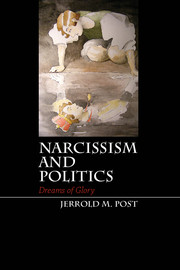Book contents
- Frontmatter
- Dedication
- Contents
- Preface
- 1 Narcissism in Full Bloom
- 2 Dreams of Glory and Narcissistic Rage
- 3 Great Expectations
- 4 Daughters of Destiny I: Indira Gandhi
- 5 Daughters of Destiny II: Benazir Bhutto
- 6 Narcissism and the Charismatic Leader–Follower Relationship
- 7 Selfobjects: The Special Role of Wives and the Inner Circle
- 8 Narcissism, Entitlement, Sex, and Power
- 9 An Exceptional Exception: The Rise and Fall of Italy’s Silvio Berlusconi
- 10 Phallic Narcissism in the Governor’s Mansion
- 11 The Impact of Illness and Age on Narcissistic Leaders
- 12 Seeking Immortality: Dictators and Their Progeny
- 13 Leaders by Default: Second-Choice Sons
- Concluding Note
- Bibliography
- Index
- References
4 - Daughters of Destiny I: Indira Gandhi
Published online by Cambridge University Press: 05 November 2014
- Frontmatter
- Dedication
- Contents
- Preface
- 1 Narcissism in Full Bloom
- 2 Dreams of Glory and Narcissistic Rage
- 3 Great Expectations
- 4 Daughters of Destiny I: Indira Gandhi
- 5 Daughters of Destiny II: Benazir Bhutto
- 6 Narcissism and the Charismatic Leader–Follower Relationship
- 7 Selfobjects: The Special Role of Wives and the Inner Circle
- 8 Narcissism, Entitlement, Sex, and Power
- 9 An Exceptional Exception: The Rise and Fall of Italy’s Silvio Berlusconi
- 10 Phallic Narcissism in the Governor’s Mansion
- 11 The Impact of Illness and Age on Narcissistic Leaders
- 12 Seeking Immortality: Dictators and Their Progeny
- 13 Leaders by Default: Second-Choice Sons
- Concluding Note
- Bibliography
- Index
- References
Summary
POLITICAL PEDIGREE
In reviewing Indira Gandhi’s rise to power, one first needs to search her family’s past and consider her rise from within a generational framework. It is useful to consider this from the perspective of a “telescoping of generations,” which Faimberg describes as the unconscious narcissistic link between generations, in which the identity of the individual can be influenced to incorporate the hopes, wishes, and traumas of prior generations.
The Nehru-Gandhi dynasty has been the predominant political family in India since 1958. Indira was born to Jawaharlal and Kamala Nehru in the home of her paternal grandfather, Motilal Nehru, in Allahabad, a city known to be a prominent cultural hub in northern India. The Nehru clan belonged to an exclusive community of high-caste Hindus. Motilal’s father was a respected police chief in Delhi who died three months before Motilal was born.
Motilal was a natural leader, and the admiration he received from others ultimately led him to become a member of the Indian National Congress. It was said that he had “the exquisiteness of attire which symbolized the clean fighter and the great gentleman and that impressive face, deeply lined and careworn, on which character and intellect were so deeply imprinted . . . Eminent as a lawyer, eminent as a speaker, and in the first rank as a political leader, he could not but take the foremost place wherever he might be.” At the age of 26, Motilal was thrust into the position of family caretaker after the sudden death of his brother. He rapidly became more prominent in Indian society, and he was truly looked on as a secular and worldly individual in Allahabad.
- Type
- Chapter
- Information
- Narcissism and PoliticsDreams of Glory, pp. 47 - 56Publisher: Cambridge University PressPrint publication year: 2014

